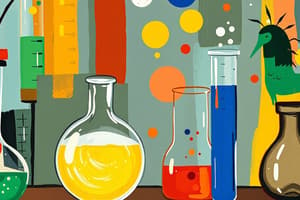Podcast
Questions and Answers
Qu'est-ce que définit une question testable en science?
Qu'est-ce que définit une question testable en science?
- Une question qui peut être répondue par une recherche en ligne
- Une question qui peut être répondue par des méthodes scientifiques (correct)
- Une question qui peut être répondue par une simple observation
- Une question qui peut être répondue par une théorie existante
Quel est le but principal de la conception d'une expérience en science?
Quel est le but principal de la conception d'une expérience en science?
- De répondre à une question de recherche (correct)
- De découvrir une nouvelle loi physique
- De concevoir un nouvel outil de mesure
- De valider une théorie existante
Qu'est-ce que doivent être les questions testables pour être efficaces pour l'expérimentation?
Qu'est-ce que doivent être les questions testables pour être efficaces pour l'expérimentation?
- Complexes et ambitieuses
- Spécifiques, mesurables, réalisables, pertinentes et définies dans le temps (SMART) (correct)
- Courtes et faciles
- Vagues et générales
Quel est l'exemple de question testable suivant?
Quel est l'exemple de question testable suivant?
Qu'est-ce que permet de distinguer une question testable d'une autre question scientifique?
Qu'est-ce que permet de distinguer une question testable d'une autre question scientifique?
Quel est l'objectif principal de la conception d'une expérience?
Quel est l'objectif principal de la conception d'une expérience?
Quel est le rôle de la variable indépendante dans une expérience?
Quel est le rôle de la variable indépendante dans une expérience?
Pourquoi est-il important de définir les variables dans une expérience?
Pourquoi est-il important de définir les variables dans une expérience?
Quel est le but de la collecte de données dans une expérience?
Quel est le but de la collecte de données dans une expérience?
Quel est le but final de la conception d'une expérience?
Quel est le but final de la conception d'une expérience?
Study Notes
Science Testable Questions: Focus on Experiment Design
Experiment design is a crucial aspect of scientific inquiry, and it starts with asking testable questions. Testable questions are essential for scientific research because they can be answered through experimentation and observation of the natural world. In this article, we will discuss the importance of testable questions in science and provide examples of how to design experiments based on testable questions.
What Makes a Testable Question?
A testable question is a question that can be answered through scientific methods, such as research, field studies, or experiments. Testable questions are different from other types of scientific questions because they can be answered by changing one variable to see its effect on another variable. They also need to be specific, measurable, attainable, relevant, and time-bound (SMART) to be effective for experimentation.
Testable Question Examples
Here are some examples of testable questions that can be used for experimentation:
- What is the effect of temperature on seed germination? This question can be made more specific by changing it to "How does the temperature of soil affect the germination of seeds?"
- Can a certain type of paper affect the distance a paper airplane flies? This question can be made more specific by identifying the independent and dependent variables, such as "How does the type of paper affect the distance a paper airplane flies?"
- What factors affect algae growth in a fish tank? This question can be made more specific by focusing on a single variable, such as "What amounts of light promote algae growth in a fish tank?"
Designing Experiments
To design an experiment based on a testable question, follow these steps:
- Identify the independent and dependent variables: In the case of the first example, the independent variable is temperature, and the dependent variable is seed germination.
- Define the variables: Determine what will be varied (changed) and what the impact of changing the variable is expected to be.
- Choose a method: Decide on the type of experiment, such as research, field study, or a controlled experiment in a lab.
- Plan the experiment: Develop a detailed plan for how the experiment will be carried out, including materials, procedures, and data collection methods.
- Collect and analyze data: Conduct the experiment and collect data on the dependent variable. Analyze the data to determine the effect of the independent variable on the dependent variable.
Conclusion
Asking testable questions is a fundamental aspect of scientific inquiry, and experiment design is an essential part of the process. By following the steps outlined above, you can design experiments that answer testable questions and contribute to the scientific understanding of the world around us.
Studying That Suits You
Use AI to generate personalized quizzes and flashcards to suit your learning preferences.
Description
Learn about the importance of testable questions in scientific research and how to design experiments based on them. Explore examples of testable questions and follow steps to plan and conduct experiments effectively.




